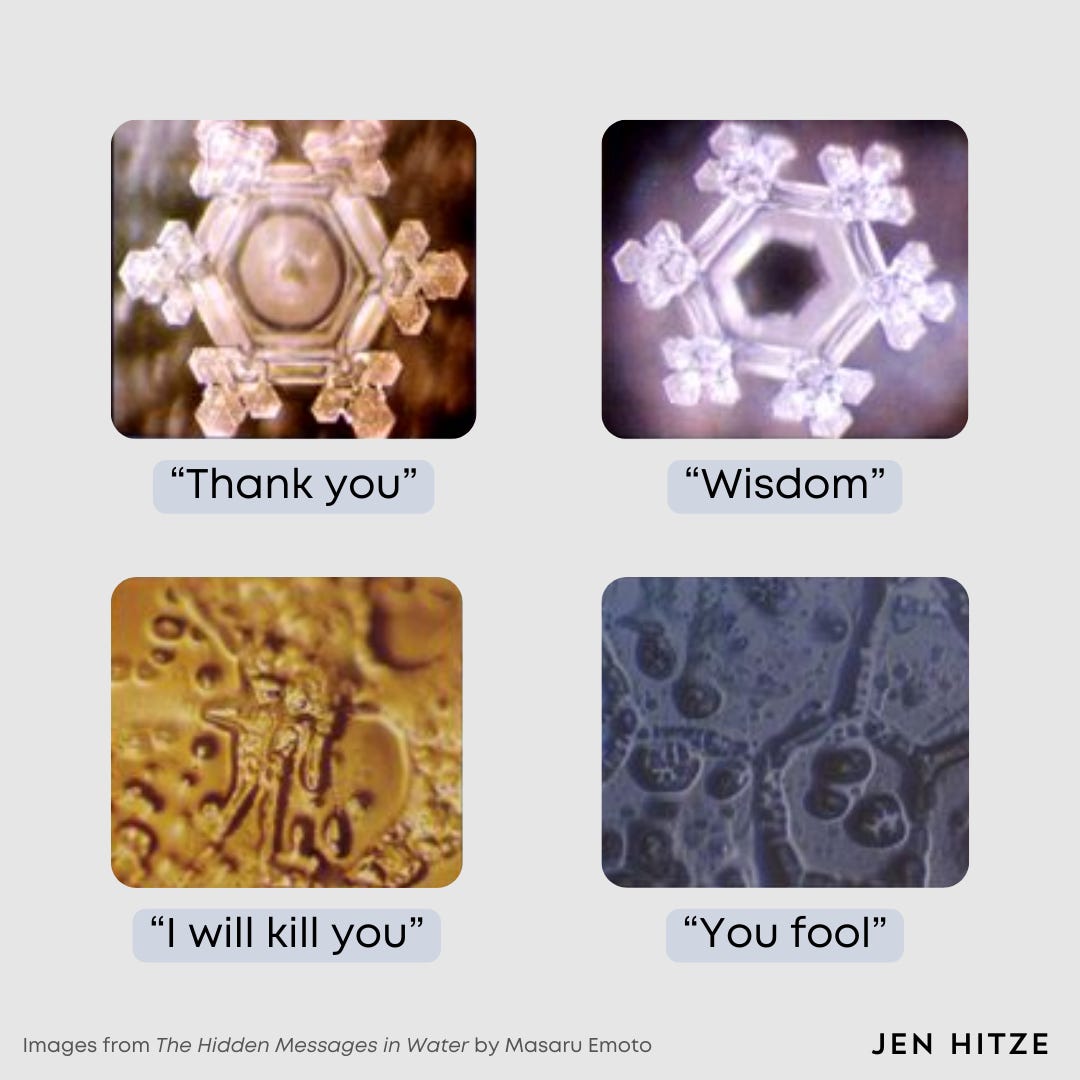Making Sense of Meaning
Choosing Happiness, Esoteric Experiments, Love & Gratitude, Empty Elucidation, Measuring Meaning
I.
Choosing Happiness
I have noticed that most people in this world are about as happy as they have made up their minds to be.
Attributed to Abraham Lincoln
It took me far too long to realize a simple fact: My happiness is up to me.
For decades, the world led me to believe differently. It told me that my happiness was dependent upon the house, the car, the job, the iPhone, the college degree, the vacations, the Instagram followers, the trendy clothes, the serums, the stimulants, and the SSRIs. I took the world’s advice—all of it. It was bullshit.
Humans have evolved into the most intelligent, productive, literate beings on Earth. We’ve landed on the moon, decoded the human genome, and created technological intelligence. We’ve defined the laws of mathematics and physics. The degree of information we have available to us is incalculable. We’ve mastered digital and physical reality. But when it comes to understanding our own human emotions—our own happiness—we still fall short.
And perhaps it’s our intelligence that leads us to forget that happiness is not something outside of us but rather something inside. It is as Hamlet utters in his legendary soliloquy, “to be, or not to be.” That, my friends, is the question.
II.
Esoteric Experiments
There’s one lesson from my seventh-grade science class that will never leave me. It was based on findings from The Hidden Messages in Water, a New York Times bestselling book by Masaru Emoto. While my science teacher warned us youngsters that the book’s findings were (and are) controversial in the scientific community, she decided they were still worthy of sharing with a class of impressionable teenagers. She told us that while the findings may be debunked, what if they turned out to be true?
The book’s primary claim is that the words we use have a profound impact on water. And because humans are 70% water, it hastily assumes that words have a profound impact on us, too. Japanese author and businessman Masaru Emoto is said to have spent over a decade researching the impact of words on water using self-directed, speculative methods. He exposed water to various words and affirmations in two ways: speaking directly to a glass of water and attaching a paper inscribed with words facing inward towards the water. He then froze water samples from these glasses and captured images of the resulting ice crystals. His experiments suggest that water exposed to positive words and affirmations—such as wisdom, thank you, and you’re beautiful—resulted in elegant ice crystals, while water exposed to negative words—including Satan, you fool, and I will kill you—resulted in malformed ice crystals. Below are some images he included in the book.
During my undergrad studies in biomed, I scoffed at my former teacher’s decision to share something so nonscientific with her class of “gifted” students. Emoto, a sovereign freethinker lacking scientific credentials and peer-reviewed research posits that words can alter the molecular structure of water? Gimme a break.
But years later, after departing the rigid world of science and medicine for the creative realm of literature, I discovered a newfound openness to concepts beyond scientific validation. Ideas are just ideas, after all. The Genesis story cannot be proven, yet millions believe in it anyway. And they seem to be doing just fine. What if we don’t need science to prove something that we feel is so viscerally true? What if we can hold space for some things that can only be backed by faith?
What if water is influenced by the words that we use? What if we are?
III.
Love & Gratitude
According to Emoto, the words love and gratitude make the most beautiful ice crystals. But according to everyone else, these two words describe two of the most powerful human emotions. If words really do affect water (and people), these two words would undoubtedly be the ones to make the most positive impact.
On Love
Love, as I know it, is a universal force. It exists in each one of us in the way that consciousness does. We don’t question our consciousness; we simply are conscious. The same can be said of love. We are love. Love is a deeply internal phenomenon; you won’t find it on the outside. You won’t find it in another person or money or a job or a perfect body or whathaveyou. The ego deceives us into thinking that love exists outside of oneself because this belief blinds us to the very thing that will obliterate the ego. When we witness love externally, whether in another individual or in beauty, it has the potential to awaken the love that is inherent within us. As Meher Baba puts it, love is self-communicative: those who fail to recognize it within themselves can learn how to find it from those who do.
On Gratitude
There are two types of happiness: fleeting and enduring. Fleeting happiness arises from external stimuli and is short-lived. It’s felt in the moments when you bring home a brand-new car or open an email with a killer job offer. It’s found in vacations, puppies, and delicious meals. This type of happiness is familiar to us all, and we know it fades before it has barely begun. By the end of that first week with the new car, it feels par for the course. At the end of the first day on the new job, the mundanity you felt in your last one starts to creep up once again.
But the other kind of happiness, the one we all long for, is enduring happiness. Like love, enduring happiness comes from within. It stems from gratitude, the ongoing practice of appreciating what we have in our lives. It entails finding joy in the new car long after its novelty has worn off, and being thankful for the work we do each day. Gratitude (i.e., enduring happiness) is a conscious choice and an active practice. By choosing gratitude, we acknowledge that what we have is more than enough. Gratitude is prolonged happiness independent of the newness of specific events; it is happiness that persists in their absence.
IV.
Empty Elucidation
The heart has its reasons, which reason does not know. We feel it in a thousand things. I say that the heart naturally loves the Universal Being, and also itself naturally, according as it gives itself to them; and it hardens itself against one or the other at its will. You have rejected the one, and kept the other. Is it by reason that you love yourself?
It is the heart which experiences God, and not the reason. This, then, is faith: God felt by the heart, not by the reason.
Blaise Pascal, Thoughts (Project Gutenberg translation)
Love and gratitude are two of the most tangible intangibles we encounter daily. We can’t measure love or gratitude or any other emotions for that matter because they’re formless, nonmaterial. We can’t apply our laws of mathematics or physics to them to make them make sense. But we can attempt to articulate their significance and describe their impact through language. Drawing upon our understanding of physical phenomena, we can craft metaphors, poetry, and ideas in an attempt to rationalize what’s inherently irrational. In other words, we can make “stuff” up.
But emotions will never be “stuff.” They will never be tangible, analyzable, cognitive. As Pascal described, they are felt by the heart, not by our mental faculties.
V.
Measuring Meaning
The following passage comes from the late neurosurgeon and writer Paul Kalanithi:
Yet the paradox is that scientific methodology is the product of human hands and thus cannot reach some permanent truth. We build scientific theories to organize and manipulate the world, to reduce phenomena into manageable units. Science is based on reproducibility and manufactured objectivity. As strong as that makes its ability to generate claims about matter and energy, it also makes scientific knowledge inapplicable to the existential, visceral nature of human life, which is unique and subjective and unpredictable. Science may provide the most useful way to organize empirical, reproducible data, but its power to do so is predicated on its inability to grasp the most central aspects of human life: hope, fear, love, hate, beauty, envy, honor, weakness, striving, suffering, virtue.
Paul Kalanithi, When Breath Becomes Air







I am firm believer in transference.
1. How do you explain auras people give off? Aura colors are just like the rainbow we see. The spectrum is a range of colors people give off and we can see that transferred into feelings, intuition, or even energy. Hence the term trust your feelings or intuition.
Note - probably goes the same with animals. They probably see this too. Hence why some cats or dogs know a bad person on sight or smell.
2. People who look inwards to their own happiness have long been labeled introverted or difficult by others. We are starting to realize those who are actually happy with themselves exist on a higher plane of self awareness. They just give off a different 'vibe' as they like to call it. There is a reason why in cultures of the past, the most enlightened were the ones who looked in rather than looked out.
-
One can have no smaller or greater mastery than the mastery of one's self - Leonardo DaVinci
What if it wasn’t the words at all, but the frequency/vibration that was emitted? People can say all kinds of words, but the vibration with which they deliver them makes a world of difference. If I don’t feel gratitude or love when I say thank you or I love you, the frequency or vibration is not the same as when I ardently and effusively express my gratitude or love. I am a person who loves words, and I firmly believe it’s the vibes, man! ☺️